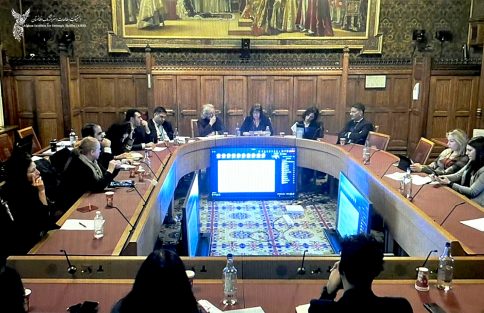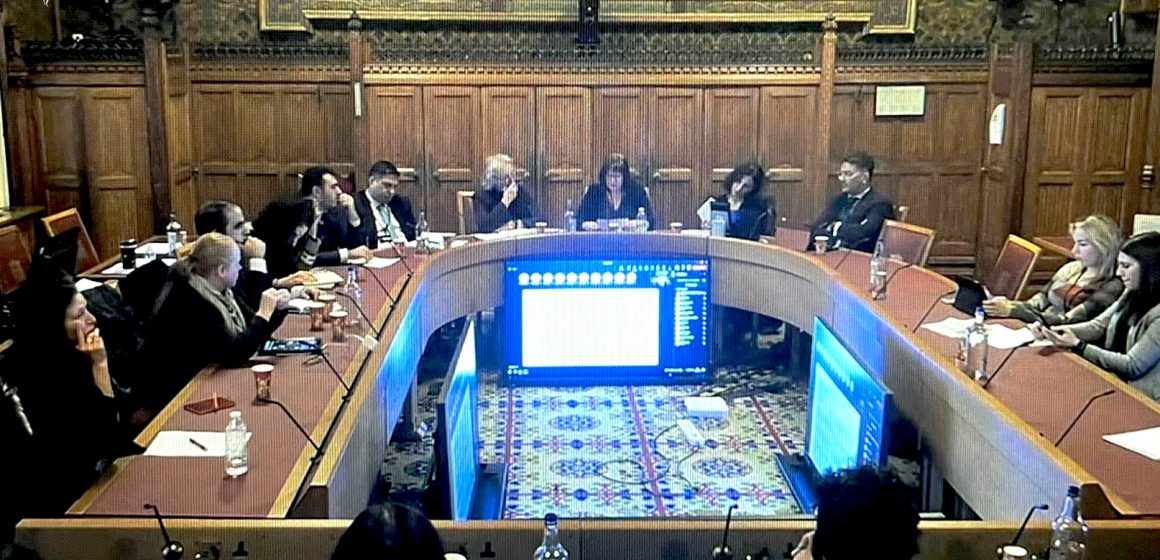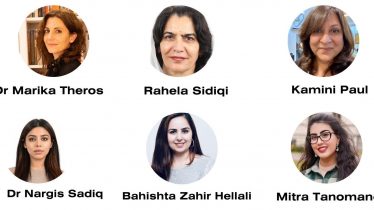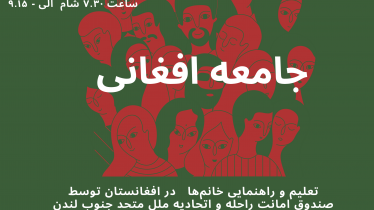Rahela Trust’s AGM and Annual Lecture 2023
On Monday 27th February 2023, we hosted our AGM and Annual Lecture at the House of Lords. Talks centred around how women can access education and work in Afghanistan today.

The event was
chaired by Baroness Fiona Hodgson of Abginer, CBE, and we had four brilliant speakers including:
– Dr. Davood Moradian (Director of Afghan Institute for Strategic Studies, AISS)
– Forozan Rasooli (Afghan Women’s Rights Activist)
– Hameed Hakimi (Associate Fellow at Chatham House and Senior Fellow at Atlantic Council)
– Wahidullah Azizi (Anti-corruption & Social Activist)
– Marika Theros (Policy fellow and Peacerep’s Afghanistan Research Director, London School of Economics)
Wahid Azizi (Anti-corruption & social activist)
As well as an introductory speech written by Rahela Sidiqi and read by the Chairperson of Rahela Trust Samantha Rennie.
You can read the speech below.
Scroll to the bottom of this post to explore some of the other event materials.
The Current Situation of Women in Afghanistan.
The brutal reality of Afghan women being excluded from public life continues. Women have been banned from using parks, gyms, public bath houses; banned from most workplaces; and many restrictions are imposed on their movement and freedom. This is happening in line with the de-facto authorities’ interpretation of Sharia Law. Although some exceptions are considered for women health workers doing lifesaving work, the space for women to operate is extremely limited. This has ramifications for all Afghans. According to UN Women, many aid agencies have suspended their operations because it is too difficult for them to access families in need without female staff (UN Women, 2023). So an already grave humanitarian crisis is being made worse.
The most recent restriction has been on secondary and higher education: authorities have closed universities to female students until further notice and decreed that girls may no longer be enrolled in secondary schools.
In January 2023, UN deputy Secretary General Amina Mohammed, UN Executive Director Sima Bahous, and Assistant Secretary General for UN political, peace building and peace operations Khaled Khairi spent four days “fact-finding” and engaging with Afghanistan’s de-facto authorities to “underscore UN solidarity with the Afghan people.” They concluded that “What is happening in Afghanistan is a grave women’s right crisis and a wakeup call for the international community…. It shows how quickly decades of progress on women´s rights can be reversed in a matter of days.” (UNAMA, 2023; UN Women, 2023).
According to sources on the ground, the Taliban have been very strict in monitoring and enforcing their edicts since September 2021. Gradually, but systematically, space for adolescent females has disappeared. All school doors were closed to girls in all 28 provinces, and only six provinces are said to have re-opened primary schools for girls. Older girls were not allowed to sit the Concours examination. Mixed messages are now being sent from the technical and political branches of the de facto government, creating confusion about the future. It is impossible for local schools to make plans for the coming year, due to start in March – but it looks very unlikely that girls’ schools will re-open. According to grassroots information from around 100 partners involved in Education in Afghanistan there has been no evaluation or preparation for resuming secondary education.
Those who try to teach girls despite the restrictions face repercussions. According to local sources and social media, a female teacher was detained by the de-facto authorities because she had set up a classroom in her house. She was six months pregnant when authorities arrested her.
The impact of these restrictions is hard to measure, but a few examples from news stories give a sense of how desperate they are making people. There is a girl from GhuJaan village in the Raghestan District of Badakhshan who, according to the local HashtSubh News, recently committed suicide. It is unclear why – There could be any other reason but the most common reason at present is Taliban abuse, force marriage or anxiety of not being able to continue her education or being able to work. Did she lose all hope for the future? We can only guess. There is the story of Nargis Sadat, who was arrested recently for protesting peacefully against the Taliban’s restrictions on women’s rights. And last month there was a news report that a ten-year-old girl was killed by the Taliban in Kabul.
These are just a few examples of Taliban violence against women, directly and indirectly,but there are certainly hundreds more all over the country. Female citizens have no human rights.
Despite all this suffering, there some signs of hope are being reported by people on the ground:
– It is said that the Ministry of Education wants to hire six women as national technical advisers;
– The same Ministry has agreed to distribute forty million text books based on those used five years ago;
– Local distribution of text books for seven to twelve year olds girls is allowed;
– Thirteen thousand female teachers from secondary school are still receiving their salaries;
– The Ministry of Education is allowing community-based education: there were 7,000 classes in July, which rose to 22,000 in February, and 20% of the classes were for adolescents.
In conclusion, it is obvious that, from the moment when the Taliban took over on August 15, 2021, women’s most basic rights have been systematically violated. BBC Persian has broken down Taliban restrictions on women into four main areas: exclusion from politics; restriction of activities in public spaces; restriction of continuing education; and restrictions on the right to work. These are all in contradiction to the promises the Taliban made to the international community (BBC Persian, 2023).
Nonetheless, Afghan women continue to defend their basic rights.In the International Day of Social Justice, which used to take place on 20th February, a number of Afghan women and youth protested against injustice in Afghan society and asked the international community not to not abandon them (VOA, 2023).
We list the most urgent issues here:
– No right to education for females
– Restriction of free movement and severely constrained dress codes
– Lack of legal protection for females whose rights are violated
– Increase rates of child marriage because of poverty
– Severely limited opportunities for females to work
– Women’s rights activists under pressure
– Women have been removed from the political and social arena.
– Harsh discrimination against LGBTQ community
Our key recommendation is that all the points above, which are restricting women’s lives, are gender persecution and must be lifted.
References:
BBC Persian (2023) ۲۰فرمان طالبان بهطور سیستماتیک زنان را محدود کرده است, BBC News فارسی. Available at: https://www.bbc.com/persian/articles/cy0kld42xexo (Accessed: 21 February 2023).
UN Women (2023) ‘Afghanistan: Top UN delegation tells Taliban to end confinement, deprivation, abuse of women’s rights’, UN Women Sverige, 22 January. Available at: https://www.unwomen.se/afghanistan-top-un-delegation-tells-taliban-to-end-confinement-deprivation-abuse-of-womens-rights/ (Accessed: 21 February 2023).
UNAMA, N. (2023) UN Deputy Secretary-General Amina Mohammed’s press conference upon her return from Afghanistan, UNAMA. Available at: https://unama.unmissions.org/un-deputy-secretary-general-amina-mohammed%E2%80%99s-press-conference-upon-her-return-afghanistan (Accessed: 21 February 2023).
VOA (2023) روز جهانی عدالت اجتماعی؛ فعالان زن از بیعدالتی زیر سلطهٔ طالبان شکایت دارند, صدای امریکا. Available at: https://www.darivoa.com/a/afghan-women-compaints-from-lack-of-social-justice-in-afghanistan/6970807.html (Accessed: 21 February 2023).




